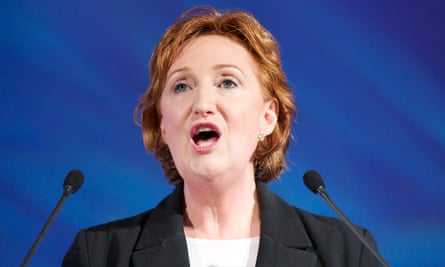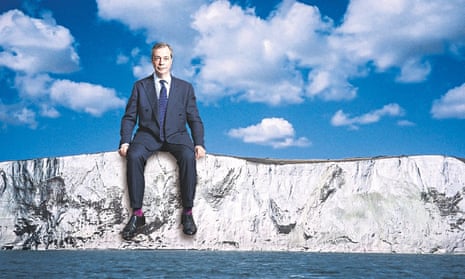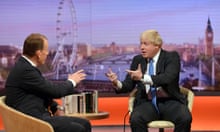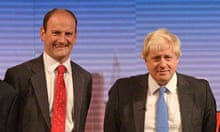Welcome, once again, to the messy and uncertain future of British politics. On the Essex coast, the UK Independence Party has just won its first parliamentary byelection; in Greater Manchester, they have come within a whisker of snatching a hitherto safe seat from Labour. Having once warned the Conservatives against “banging on” about Europe, David Cameron leads a party that is arguably more obsessed about it than ever. And a new word has entered the political lexicon, which may soon become inescapable.
“Brexit” is shorthand for British exit from the European Union – a possibility that is looking more realistic by the day. Ukip, after all, are in the midst of a seemingly endless political summer, while senior Conservative politicians such as Boris Johnson talk optimistically about life outside the clutches of Brussels. Should they win next year’s election, the Tories are pledged to follow a renegotiation of Britain’s membership with an in/out referendum that will supposedly materialise by the end of 2017. Meanwhile, a debate rages between two sides that do not just seem to be from opposed political traditions, but different planets.
Mark Leonard, for example, is probably the embodiment of everything Ukip exists to fight. An urbane, multi-lingual product of the mid-1990s milieu surrounding New Labour, he has some claim to inventing the metropolitan notion of “Cool Britannia”. In 2005, he authored an impressive and somewhat optimistic book titled Why Europe Will Run the 21st Century. He’s now a co-founder and director of the European Council on Foreign Relations: as its promotional blurb puts it, “the first pan-European thinktank”. These, surely, are words to make Nigel Farage spit out his pint.
Leonard spends much of his time talking to people at the core of the EU, and of late, he has started to pick up rising worry about whether the UK might leave. “It’s gone from something that was a fantasy among some members of the Tory party – John Redwood and people like that – to being a real prospect,” he tells me, with a kind of anxious incredulity. Moreover, plenty of Europeans are beginning to think of the UK as a power that has already turned its back on them. “We’re not actually making many constructive suggestions about the future of Europe,” says Leonard. “So we’re not really much good to anyone else at the moment.”
To some people, this is nothing to worry about. Ukip’s deputy leader is Paul Nuttall, the Liverpudlian MEP who represents the north-west of England. He speaks to me from his office in Brussels, and energetically sketches out a vision that now stretches from his party into the heart of British Conservatism: of Britain cut loose from the EU, with no real downsides at all. What gets Nuttall out of bed in the morning is “an issue of sovereignty of democracy” – but, conveniently enough, if Britain were to leave, there would also be no end of economic benefits.
As he and his party see it, the UK should get out as quickly as possible, and replace the economic aspects of our EU membership with “a simple free trade deal, either with individual countries or with the European Union as a whole”. This would put us in a comparable position to Switzerland, whose dealings with the EU are framed in a series of bilateral treaties – but with one crucial difference. “We’re not Switzerland,” says Nuttall. “We’re the seventh-largest economy in the world, and we’re Great Britain. And because we run a huge trade deficit with the EU, they’d need us far more than we would need them.” All told, if we left, “we would be a better place to do business”.
This, I remind him, is not exactly the view of a lot of businesses. The Confederation of British Industry (CBI), for example, thinks that Britain’s membership of the EU is worth up to 5% of GDP, or as much as £78bn a year – roughly the combined worth of the economies of north-east England and Northern Ireland. That’s a lot to lose.
“I take everything the CBI says with a pinch of salt,” says Nuttall. “The CBI want us to stay in the European Union, and they’ve made that perfectly clear. I’m more concerned about working-class people who are seeing their wages driven down by immigration.”
At the very least, I suggest to him, a British exit would create no end of economic turbulence. After all, when it looked as if Scotland was thinking seriously about leaving the UK, billions of pounds were wiped off the stock market. So imagine what would happen if Britain leaving the EU actually came to pass: an economic catastrophe, some people reckon.
Among them is Roland Rudd, the City insider who is the chairman of the communications firm Finsbury (which represents such clients as BSkyB, Marks and Spencer and the mining giant Glencore), and the founder of a pro-EU group called Business for New Europe. He reminds me that such US-owned financial institutions as Bank of America, Citigroup and Morgan Stanley are said to be considering leaving London if Britain quits Europe. Should it happen, he thinks this would only be the start. “Our financial centre would get hollowed out,” he says. “There are around 500 banks that have their headquarters here, and without a passport to operate throughout Europe in the form of the single market, they simply can’t be here. Financial services represents about 10% of GDP; if that was threatened, it would be deeply, deeply damaging.”
Nuttall bats this away. The EU, he says “is no friend of the City of London” – indeed, throwing off its shackles might attract more business. On the stock market, he goes on, Brexit may lead to “a bit of fluctuation in the short term,” but nothing more serious.

Suzanne Evans is a high-profile Ukip convert who left the Tories well before Douglas Carswell and Mark Reckless: she lost her council seat in the London borough of Merton, but now serves as Ukip’s deputy “chairman”, as well as being their parliamentary candidate in her native Shrewsbury. Europe, she tells me, was in her thoughts when she changed parties, but she now truly appreciates “just how awful it is, and how important it is for us to get out”. But what of all those grim predictions about Brexit’s dire economic consequences? “I simply don’t believe them,” she says. “The EU is actually causing economic chaos at the moment.” Evans runs a marketing and PR firm: she talks about the costs implementing European directives, claims that it is big business that defends the EU while small firms suffer, tells me that trading in the EU can be a bureaucratic “nightmare” and ends with a rhetorical question: “How can being able to negotiate our own trade deals again, in our own interests, be worse than the status quo?”
There is no precedent for a country of Britain’s size leaving the European project. In the early 1970s Norway completed negotiations to join what was then known as the European Economic Community, before a referendum kyboshed the plan – but that was more comparable to a quick annulment than a messy divorce. (Having once again voted against joining in 1994, Norway remains a member of the European Economic Area, which means that it works under regulations in which it effectively has no say.) Algeria left the forerunner of the EEC when it became independent in 1962; the 56,000 residents of Greenland departed in 1985; the French Caribbean colony of Saint Barthelemy (which, with nearly 10,000 inhabitants, has as roughly the same population as Glastonbury, in Somerset) formally exited the EU in 2012. None of these examples, needless to say, shines much light on what would happen if a country with 65 million people and such a huge economy decided to sling its hook.
This much we know: the UK is a net contributor to the EU to the tune of around £12bn a year. But the EU is the our main trading partner, something worth more than £400bn a year to the UK economy. Around 1.8 million British citizens live in other EU countries, a million of them in Spain. The UK shares a land border with the Republic of Ireland – a country which, if we left the EU, would obviously stay within it (more of which in a moment). All told, after 41 years of membership, the EU is tightly woven into just about every aspect of our national life.
“Leaving wouldn’t be a straightforward process,” says Leonard. “It could take years and years and years, and cost an enormous amount of money. Think about the tens of thousands of regulations we have that govern every industrial sector, and everything that gets made. Or passports: you’d need new ones, new forms, new border controls … new everything. Tens of billions of pounds would have to be spent, just on managing the transition.”
Leonard also talks about Britain being a diminished presence internationally – “Berlin would be the first port of call for any US president – we would be marginal” – before we chew over one of the most practical questions at stake.
In terms of popular support, the political drive to leave the EU is largely based on public concerns about immigration. And in that sense, if Brexit happened, the prospect of Northern Ireland sharing an open border with the Republic of Ireland would obviously represent a considerable headache. What with that issue, and the prospect of cross-border smuggling to avoid EU tariffs on some UK exports, something diplomats call a “hard border” would suddenly be on the agenda. “That could destabilise the peace in Northern Ireland,” says Leonard. “When I speak to Irish people, they’re very worried about the Troubles being kind of re-ignited. There are also big economic issues: Ireland is a bigger trading partner for Britain than the Bric countries [Brazil, Russia, India and China] combined.”
“If there’s a hard border, there’s a hard border,” says Nuttall. “I personally wouldn’t have a problem if there was one … maybe southern Ireland would see how much we were prospering outside and decide that they no longer wanted to be ruled by Brussels either.”
And what of Scotland? Ukip does almost no electoral business north of the border, and before this month’s referendum on independence, polling suggested that the prospect of Britain leaving the EU sharply increased support for Scottish secession from the UK – so how Scotland would react to Brexit is a very interesting question.
The Edinburgh minister in charge of the Europe brief is the SNP’s Fiona Hyslop. “I think there’s a real danger for the UK and the Westminster parties if they present a referendum that would lead to exit from the EU,” she tells me. “That’s something that I think would be unacceptable to the people of Scotland and the Scottish government.” She will not be drawn on exactly what she means, but she says this, with a hint of menace: “I have a warning that there will be very serious consequences indeed, and I’m not sure they have been properly thought through.”
For all that there is a tradition of left-leaning euroscepticism that goes back to such figures as Tony Benn, the vast majority of our current angst about Europe is traceable to the political right. Indeed, if English Euroscepticism has an elder statesman - and most prominent Eurosceptics are men — it is surely the 74 year-old Conservative MP (Sir) Bill Cash. A veteran of the rebellions against the 1992 Maastricht treaty that put modern Tory hostility to Brussels on the political map, he was battling the EU when Nigel Farage was an unknown twentysomething working for a French bank. Cash now serves as the chair of the House of Commons European Scrutiny Committee, and is also well aware of what Ukip are up to: his son, William Jr, is Ukip’s heritage spokesman, and is reportedly set on standing for Nigel Farage’s party at the next election. “I’m pretty cross, actually,” says Cash.
“I’ve disassociated myself from what he’s done, and I’m hoping to have a proper discussion with him.”
As against what he sees as Ukip’s “unintelligent” approach, Cash has tended to style himself as a “Eurorealist”, believing – in theory, at least – that the EU could be so could drastically reformed that he and his Eurosceptic allies would be happy staying in. He thinks that the Eurozone’s economic woes mean “the whole thing is beginning to crack”, and sketches out the unlikely-sounding scenario of David Cameron realizing his current approach to renegotiation isn’t ambitious enough, and somehow leading an argument that would lead to a “a whole new architecture in Europe”.
All that said, Cash thinks Brexit is nothing to be scared of. Disentangling the UK from Brussels, he tells me, would be relatively straightforward: “I would have thought the process wouldn’t take more than two years.” I suggest that sounds rather optimistic, and mention starting again from scratch with, for example, our passport system. “These things do take time, and they also involve cost,” he concedes. “But the costs are worth it if you’re going to preserve your democratic right to govern yourself, and be a free and prosperous country.” All this, he assures me, is better than being “being inflicted by an unstable and imploding Europe that doesn’t work. And if we exit, other countries will follow us. That’s my judgment.”
Again, the prospect of stock market meltdown is swatted away: “I don’t think that follows at all … if you’re coming forward with a positive proposal to trade across Europe and the world, a lot of the stock markets would say, hooray.”
Then why do US-owned banks threaten to leave? “Well, that’s a very interesting question to which there’s no obvious answer … since 1945, there has been a continuous stream or argument coming from the US in favour of a United States of Europe. All I’d say to that is: I’m sorry, you’re wrong.”
If Britain leaves the EU, Cash says, it will mark something as historic as the abolition of slavery, the repeal of the corn laws (which, with echoes of what may happen again, split the Tory party), the franchise-extending Reform Act of 1867, and the convulsive events of the 1930s. Not for the first time, I’m reminded of the drastically different ways that each side of the argument thinks about what’s at stake.
One camp worries about jobs, border posts and passports; the other talks passionately about national sovereignty, and hears the call of history. Europhobes are from Mars; Europhiles are from Venus. And as the great political war about Europe grinds on, any kind of truce seems more unlikely than ever.











Comments (…)
Sign in or create your Guardian account to join the discussion